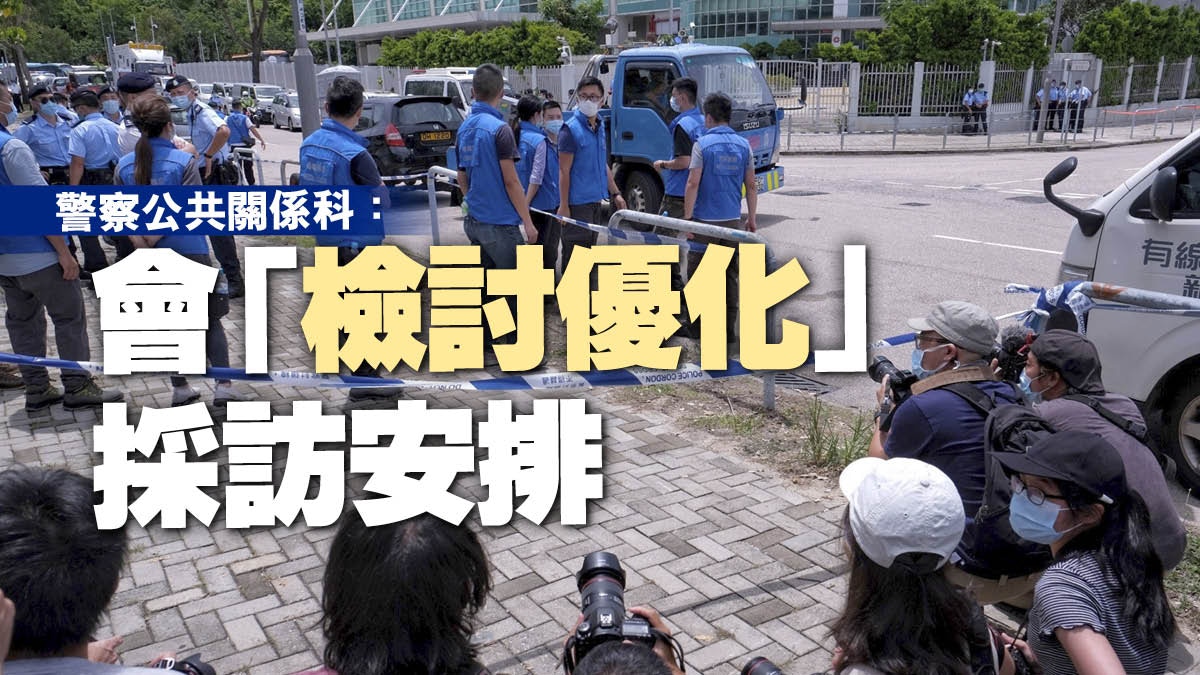01 view
Written by: Commentary Editing Room
2020-08-12 06:15
Last update date: 2020-08-12 06:15On Monday (10th), the police mobilized 200 police officers to search a newspaper office and arrested several senior officials. During the operation, the police only selected some media to enter the blockade for interviews. During the interview, Director Deng Bingqiang stated clearly that he would assist the media interviews that would not hinder the police, and he was suspected of screening the media. Although the police want to make law enforcement work smoother, the current guidelines are not clear. They should discuss with the industry and improve the mechanism.
On August 10, the police set a cordon outside the One Apple Building, and some media failed to enter the specific interview area. (Photo by Luo Junhao)
On Monday, the police pulled a cordon over 100 meters away from the newspaper building, and some media were allowed to go to the "interview area" within the cordon. The police media liaison team explained at the time that it would approve local media that are well-known, larger in scale, and have not hindered the police in the past. The Chief Superintendent of the Police Public Relations Division Kwok Ka-quan and Commissioner Tang Ping-keung also said later that the police must first ensure that the media will not hinder frontline work or pose a danger.
It is true that last year the anti-amendment law turmoil fell, and there were often "persons wearing yellow vests" who claimed to be reporters but acted unprofessional, and some even hindered police work. It is necessary for the police to adjust the arrangements for media interviews, but the principles of the specific arrangements should be clear and the details should be reasonable. For example, foreign media reporters also have the right to report in Hong Kong. Why are the Associated Press and Agence France-Presse excluded? Another example is the rejection of Radio Television Hong Kong as a local reporter. It also raises concerns about whether the rationale is sufficient.
The word "trustworthy" is vague
The "Police General Regulations" pointed out that police officers must cooperate with the media in a "mutual understanding and mutual accommodation" and should not hinder the interview work. It also mentioned that the media includes journalists with certificates issued by newspapers, news agencies, television stations, and radio stations, and the Hong Kong Journalists Association and photojournalists. The membership card of the association is also one of them. If the standards can be clear, it will not only be easier for the industry to understand, but it can also create an image for the police to show that they are not targeting or suppressing some of the media. The criterion of "trustworthiness" alone will inevitably become subjective and vague, which will easily cause bad impressions.
+2
Secondly, under what occasions and places need to be delineated? The Chief Superintendent of the Police Public Relations Division Kwok Ka-quan and Director Tang Ping-keung pointed out that when the police arrange for the media to enter the blockade, they must first ensure that the media will not hinder frontline work or pose a danger. But there are actually many types of police actions, some in public places and some in private places. For example, if it is a street demonstration and a clash between police and civilians, the scene will generally be chaotic, and the police may have higher requirements for order control. However, if you are investigating commercial crimes in an office building, or holding a press conference at the police headquarters, the situation is simpler, and media interviews are less likely to conflict with police work. The police should have fair and clear guidelines under what circumstances and for what needs to draw a cordon.
The police and reporters have their own responsibilities, and there have been conflicts in recent years, but the two are not necessarily either one or the other. As the "Police General Regulations" pointed out, police officers must cooperate with media interviews, which shows that the relationship between the two does not necessarily have to conflict. Take the online media as an example. It was not recognized at first. After some struggle, the government, including the police department, had conditions to allow online media interviews. The two are considered to have reached a consensus. When Guo Jiaquan was asked about the new interview arrangements on Tuesday, he responded that it was a new attempt, and after hearing different opinions, the police would "review and optimize." It is hoped that the review will not be a rhetoric, but will fully exchange opinions with the media and discuss the interview guidelines agreed by both parties.
Four questions about the reporter certification system
The media was criticized as "black note". How did the Association respond?
The key to icebreaking between the police and media organizations is professional
01 depth
Police Deng Pingqiang Police Reporter Hong Kong Journalists Association 01 Viewpoint

